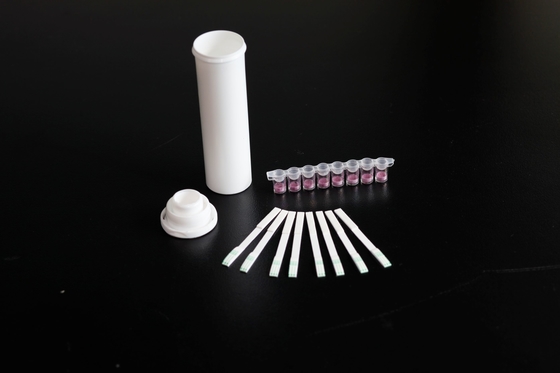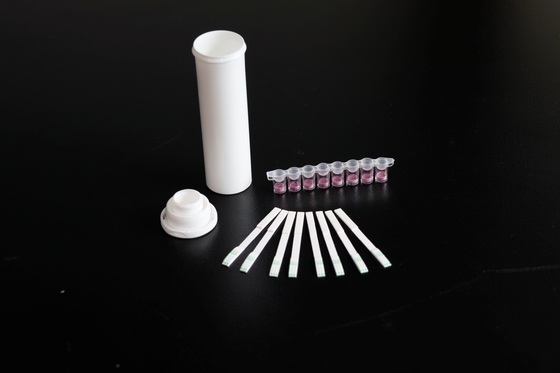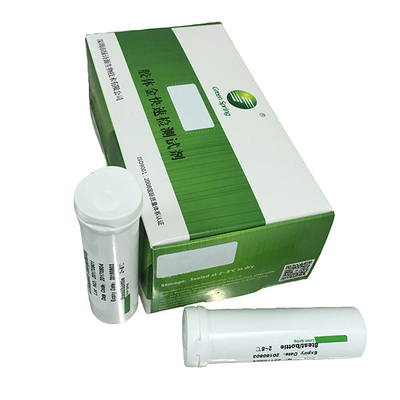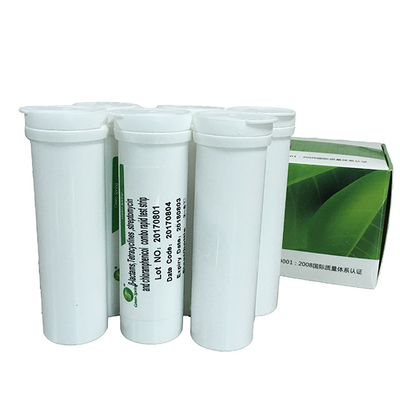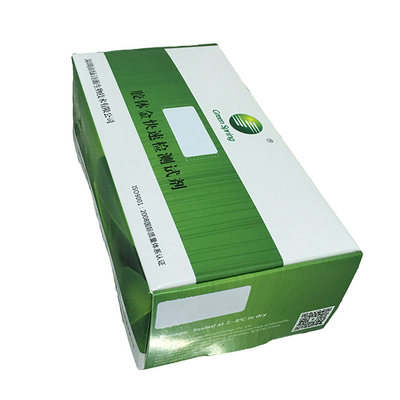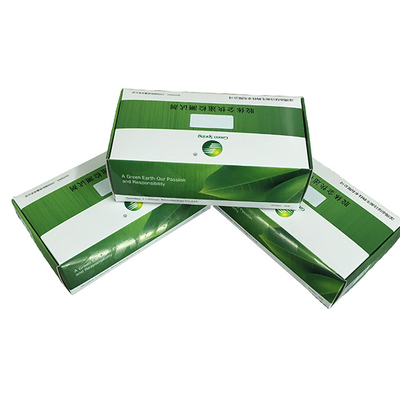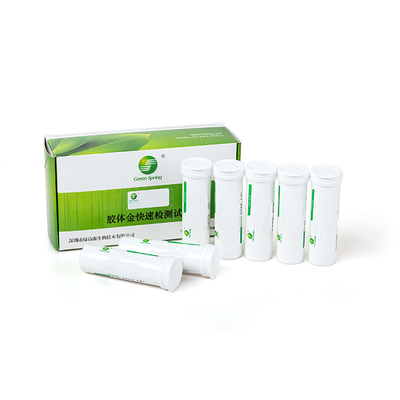|
|
Nitrofuran SEM rapid test strip for dairy product detection limit 0.5ppb qualitative testing
Product Details:
Payment & Shipping Terms:
|
| Sample Performance: | Fresh Milk, Pasteurized Milk, Pure Cow/goat Milk, Whole Milk Powder | Sensitivity: | 0.5μg/kg( Ppb) |
|---|---|---|---|
| Shelf Life: | 12 Months | Incubation Time: | 5min-5min |
| Specifications: | 20 Strips/kit |
Nitrofuran(SEM) rapid test strips (Milk)
Catalog No. LSY-20053m
1. Brief
This product is used for testing Nitrofuran(SEM) in dairy product qualitatively. The whole test only needs 40-45min, easy to operate with high sensitivity.
2.Specifications 20 tests/kit
3. Components
| 1 | Nitrofuran(SEM) test strips and micro-wells reagent | 20 pieces |
| 2 | Manual | 1 piece |
| 3 | 1M HCl (25ml/bottle) | 1 bottle |
| 4 | Derivatization reagent (10ml/bottle) | 1 bottle |
| 5 | 1M K2HPO4 solution (15ml/bottle) | 1 bottle |
| 6 | 1M NaOH (25ml/bottle) | 1 bottle |
| 7 | Ethyl acetate (60ml/bottle) | 2 bottles |
| 8 | N-hexane (12ml/bottle) | 2 bottles |
| 9 | Sample buffer (25ml/bottle) | 1 bottle |
4. Application
Dairy products: fresh milk, pasteurized milk, pure cow/goat milk, whole milk powder (dissolve 1g of milk powder in 9ml of pure water and mix thoroughly)
5. Detection limit: 0.5μg/kg(ppb)
6. Date of manufacture and batch number: See bag and outer box for details.
7. Principle
The colloidal gold immuno-chromatography was used to detect the Nitrofuran(SEM) residue in the samples. The binding of Nitrofuran(SEM) to the specific monoclonal antibody labeled with colloidal gold inhibited the binding of the antibody to the conjugates of Nitrofuran(SEM)-BSA on the NC membrane Testing line, which resulted in the color depth variation of the testing line.
8. Testing equipment and materials required
Instruments: Centrifuge, water bath, sample concentrator, micropipette
Consumables: 15ml centrifuge tube, 10ml centrifuge tube, disposable tips
9. Sample preparation
1)Take 5±0.05ml dairy sample into 15ml centrifuge tube, add 1ml 1M HCl and 300ul Derivatization reagent, shake up-side-down for 10-20 times, put at 75℃ water bath for 10min;
2) Add 0.5ml 1M K2HPO4 solution and 1ml 1M NaOH, shake and mix for 1min, then add 5ml ethyl acetate, shake up-side-down for 10-20 times, centrifuge at 4000r/min for 5min;
3) Take 3ml up-layer liquid into a 10ml centrifuge tube, blow to dry at 75℃ by Nitrogen or air.
4) Add 1ml n-hexane shake to dissolve the dry residue (if do not dissolve the residue completely, it may lead to the result unstable), then add 1ml sample buffer, shake to even for 30s, be stable until layered(if appear emulsion, centrifuge at 4000r/min for 5min), absorb out the up-layer, take down-layer liquid for testing.
Note: The treated sample can be used for testing for Nitrofuran(AMOZ, AOZ,AHD, SEM)
10. Operation procedures
10.1 Read the instruction carefully before use. Return test strips and sample into room temperature.
10.2 Take bottles needed from the kit package, take out required microwells and strips, making proper marks. Please use these test strips within 1h. Seal the cap of the bottles, avoid moisture.
10.3 Take 200ul of the test samples into the microwells, then slowly aspirate for many times, mix thoroughly with the freeze-dried powder in the micro-wells (this step is important).
10.4 After incubating for 5min at room temperature (20-40℃), then insert the test strip into the micro-well (with the MAX line end facing downwards, allowing it to be fully immersed in the solution).
10.5 After immersing the test strip in the micro-well for 5~8 minutes, take out the strip and interpret the results according to the schematic diagram. Please interpret the results within 1 minutes, otherwise interpretation will be invalid.
11. Test Result Interpretation
11.1 Negative: T line is darker than C line, or T line has same color with C line. It means there is no Nitrofuran(SEM) residue in sample or the residue is lower than detection limit.
11.2 Positive: T line is obviously lighter than C line or T line is invisible. It means the Nitrofuran(SEM) residue is equal to or higher than detection limit.
11.3 Invalidation: C line isn’t seen wine red. It means the test card is out of efficacy, out of date or improper operation. Please run the test again using another package. If the invalid tests keep happening, please contact the supplier.
![]()
12. Precautions
1) The test strip can be used only once at room temperature, do not use test strips out of expiry date.
2) Please seal the tube after taking out required test strips. If can not use all 8 micro-wells at once, cup the rest and put it back to tube and sealed.
3) Do not touch the white membrane surface in the middle of test strip, avoid sunlight and fan blowing directly.
4) Milk samples should be fully liquid without any agglomeration and deposition.
5) During the [Sample preparation], do not vigorously shake the test substance; If emulsification occurs after centrifugation in step 2, the upper liquid layer of the emulsified phase needs to be removed completely.
6) Use the test strips testing again for positive results.
7) The results is for reference only, for confirmation, please refer to the relevant national standard methods.
8) Please contact the supplier for any questions.
13. Safety performance and garbage disposal
This product's test strips and packaging are non-toxic and harmless, and should be disposed of as dry waste; The organic reagents used are collected and centrally processed in waste liquid bottles.
14. Storage and expiry date
Storage: Store at 2-8 ℃ in dark, sealed, dry place, no frozen.
Expiry date: 12 months.
Shenzhen Lvshiyuan Biotechnology Co., Ltd
D Building, National Biological Industrial Park of Marinelife, No.2 Binhai Road, Dapeng, Shenzhen, 518120 China
Tel. 86-755-28438788
Fax 86-755-28938800
Email: info@lsybt.com
Website: www.lsybt.com
![]()
![]()
![]()
![]()
rapid response btnx
-
Nitrofuran(AHD) rapid test strip for milk 0.5ppb qualitatively test for dairy products
-
Nitrofuran(AOZ) rapid test strip for milk 0.5ppb testing time only 40-45minutes qualitatively test
-
Nitrofuran(AMOZ) rapid test strip for milk 0.5ppb 20T packing providing reagents
-
Paraquat Rapid Test Strips for milk 3ppb to detect Paraquat in dairy products 96T
-
Imidacloprid Rapid Test Strips for milk 0.5ppb to detect Imidacloprid in dairy products 96T
-
Fipronil Rapid Test Strips for milk to detect Fipronil 10ppb in dairy products 96T

